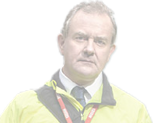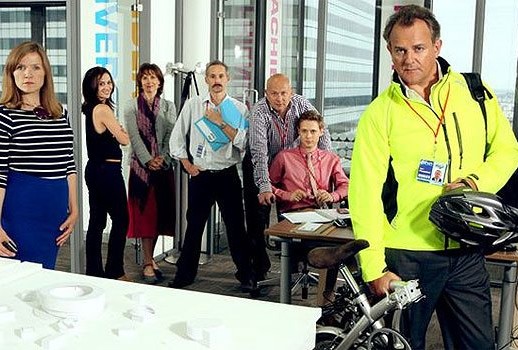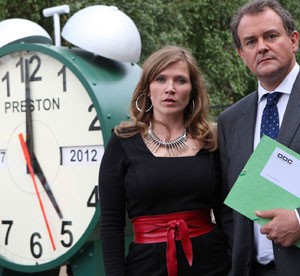Interview by Alison Kervin for the Radio Times
“It’s a critique of social incompetence, but all the scripts have their roots in credibility”
“If you get bandwidth on this, you’ve got maple syrup on your waffle at the get-go,” says Siobhan Sharpe, Head of Brand for the London 2012 Olympics. She runs her hands through her hair, smiles to herself, and looks over at her colleagues as if she’s just said something profound and life-changing. They look back at her as if she’s stark raving mad. The truth is that no one ever understands what Sharpe’s talking about. It’s hard to imagine she understands what she’s talking about herself.
I’m on the set of BBC2’s award-winning comedy Twenty Twelve, which returns for a three-part special this month, leading up to the Games. The mockumentary-style sitcom owes its success to clever, well-observed scripts by John Morton that blend the utterly insane with the entirely believable, and a cast who portray beautifully the madness and potential jeopardy involved in organising a major event.
Indeed, so close to the truth about Locog (the London Organising Committee of the Olympic and Paralympic Games) has the show come that it has been suggested that writer/director John Morton has a mole in the committee feeding him true stories. The show even had a storyline about the Olympic clock breaking down, just as the real Olympic clock broke down.
“No. Honestly, it’s all made up,” says Morton. “The clock thing was luck! I’m flattered that people think I might have guys inside feeding me lines, because presumably that means they think the show is realistic… but I don’t… not at all.”
The first three episodes of the show were screened to Locog at a breakfast meeting in a London hotel. “I assured them that I didn’t have spies in the camp and that I have gone out of my way to make sure that the characters aren’t based on real people. I’ve created titles that don’t exist, like Head of Deliverance. Everything is to one side of the real world. The show isn’t about the Olympic Games, it’s about human beings trying to interact and make things happen.”
There’s complexity as well as a lovely warmth in the characters Morton has created, which allows you to empathise with them even as they demonstrate, tirelessly, that they have no natural aptitude for the jobs they’ve been hired to do.
Sharpe, played by Jessica Hynes, is the archetypal fluffy and waffly public relations officer, while Hugh Bonneville plays Ian Fletcher, the forbearing Head of Deliverance, in a lovely, understated manner. Amelia Bullmore plays Kay Hope, Head of Sustainability, who refuses to have anything to do with “legacy” and insists that her role is focused on “sustainability”.
“The issues of legacy and sustainability appear on the Olympics website and they are concepts that are so fundamental to the organising committee that I thought I’d look at them further… not to knock them, but to gently probe,” says Morton. “I printed off a list of what each of those titles meant, then realised you could swap the list round and they would be equally relevant. I just don’t know what the difference between them is.
“When you realise that they both mean exactly the same thing, but no one is acknowledging that, it can become quite funny. It’s the detail that’s funny – the humour is all in the detail.”
“The programme is all about people being lost in their own confusion. They can’t admit that they don’t know what they’re doing, and that provides endless comic opportunity,” says Bullmore.
She says that one of her favourite scenes from the new episodes is when she and Sharpe are planting an acorn in order to grow a sustainable oak. Sharpe is supposed to have the acorn but realises she’s forgotten it, so they have to hope the world’s press, gathered for the occasion, don’t notice that they’re not planting an acorn at all. “It’s just so silly and ridiculous, and really enjoyable to do,” says Bullmore. “The sort of scene you do and laugh throughout. It’s a joy to work with material that’s so funny.”
Bonneville says he has a great deal of affection for Ian, the hapless character he plays. “It’s brilliantly written,” he says. “The grasp of management-speak is very good. Nobody is prepared to admit their inexperience in a big organisation, so there’s a sense of people whistling in the dark and doing their best to avoid disaster while the wheels are in danger of wobbling at any moment.”
But it’s Sharpe who may be the most absurd of the whole piece. “She means no harm to anyone, but she spends all her time talking in jargon and business-speak – so much so there’s a real absurdity to it,” says Hynes.
“Much of what she’s saying is meaningless, she makes no sense at all,” Hynes continues. “Like so many successful businesswomen, Siobhan is determined never to acknowledge or admit any sense of defeat or weakness. Her greatest skill is for taking other people’s ideas and making them her own. And talking nonsense… she’s good at that.”
“The series parodies an archetype,” she continues. “The Olympic world gives the whole piece a current edge, but the characters are timeless – they would fit in any big company, or an organisation like the NHS or local government.”
“One of John Morton’s great skills is clouding what we mean and don’t mean/know and don’t know, so that we can talk and talk and talk without saying anything,” Says Bonneville. “The show is a critique of social incompetence, but all the scripts have their roots in credibility so it works.”
Bonneville says that he was a sports fan before playing Fletcher, but is now more excited by the prospect of the Games after his involvement in the show. “I’ve managed to get tickets to the women’s 100m, through the ticket draw. I applied for beach volleyball tickets as well – I can’t think what it is about that sport that appeals – but I didn’t get those tickets.”










